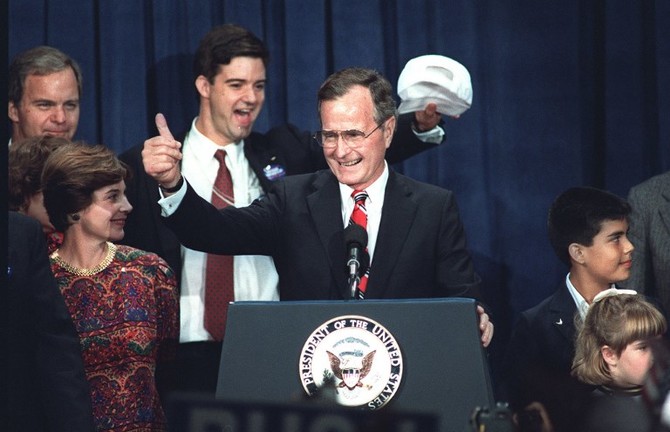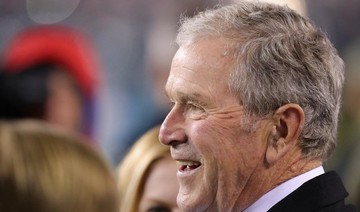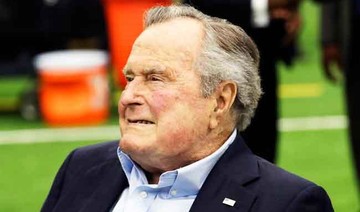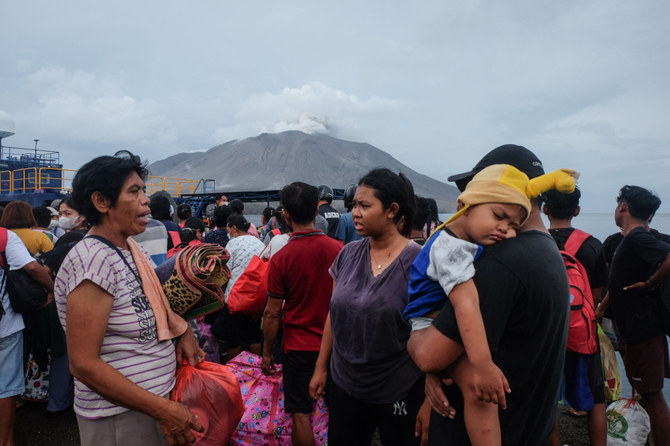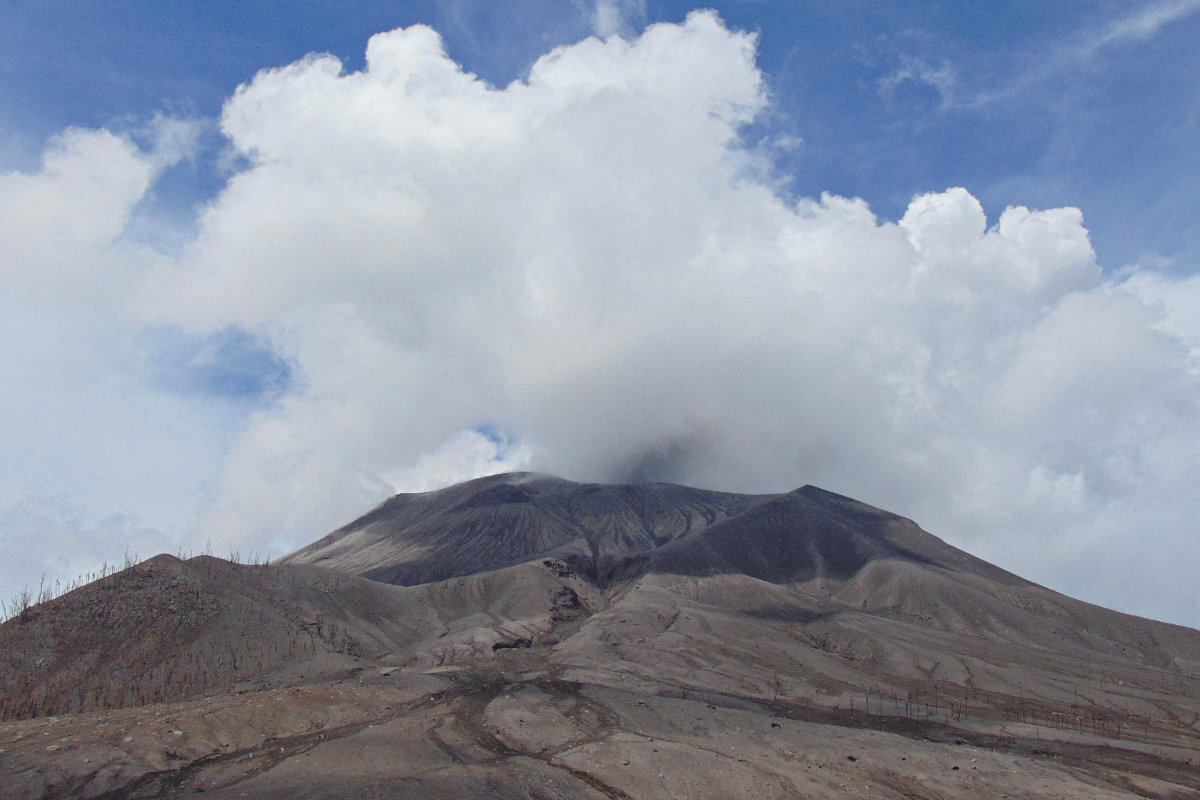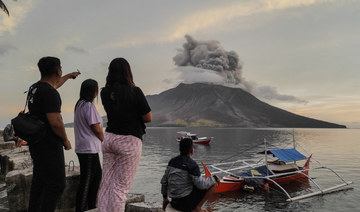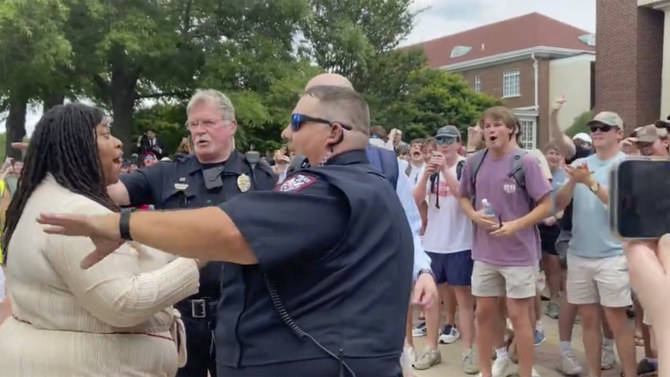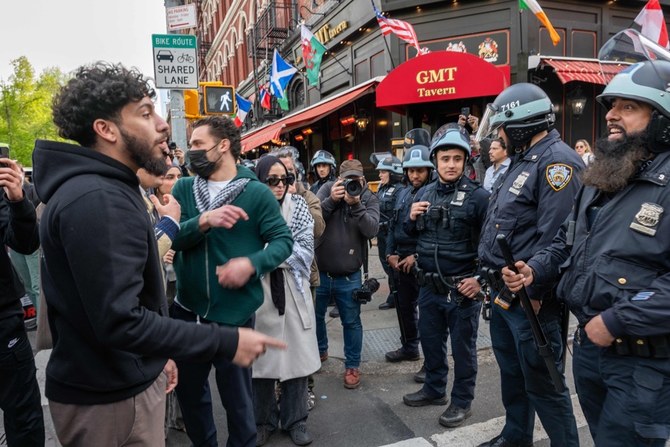HOUSTON: George H.W. Bush, a patrician New Englander whose presidency soared with the coalition victory over Iraq in Kuwait, but then plummeted in the throes of a weak economy that led voters to turn him out of office after a single term, has died. He was 94.
The World War II hero, who also presided during the collapse of the Soviet Union and the final months of the Cold War, died late Friday night, said family spokesman Jim McGrath. His wife of more than 70 years, Barbara Bush, died in April 2018.

The son of a senator and father of a president, Bush was the man with the golden resume who rose through the political ranks: from congressman to UN ambassador, Republican Party chairman to envoy to China, CIA director to two-term vice president under the hugely popular Ronald Reagan. The 1991 Gulf War stoked his popularity. But Bush would acknowledge that he had trouble articulating “the vision thing,” and he was haunted by his decision to break a stern, solemn vow he made to voters: “Read my lips. No new taxes.”
He lost his bid for re-election to Bill Clinton in a campaign in which businessman H. Ross Perot took almost 19 percent of the vote as an independent candidate. Still, he lived to see his son, George W., twice elected to the presidency — only the second father-and-son chief executives, following John Adams and John Quincy Adams.
The 43rd president issued a statement Friday following his father’s death, saying the elder Bush “was a man of the highest character.”
“The entire Bush family is deeply grateful for 41’s life and love, for the compassion of those who have cared and prayed for Dad,” the statement read.
After his 1992 defeat, George H.W. Bush complained that media-created “myths” gave voters a mistaken impression that he did not identify with the lives of ordinary Americans. He decided he lost because he “just wasn’t a good enough communicator.”
Once out of office, Bush was content to remain on the sidelines, except for an occasional speech or paid appearance and visits abroad. He backed Clinton on the North American Free Trade Agreement, which had its genesis during his own presidency. He visited the Middle East, where he was revered for his defense of Kuwait. And he returned to China, where he was welcomed as “an old friend” from his days as the US ambassador there.
He later teamed with Clinton to raise tens of millions of dollars for victims of a 2004 tsunami in the Indian Ocean and Hurricane Katrina, which swamped New Orleans and the Gulf Coast in 2005. During their wide-ranging travels, the political odd couple grew close.
“Who would have thought that I would be working with Bill Clinton, of all people?” Bush quipped in October 2005.
In his post-presidency, Bush’s popularity rebounded with the growth of his reputation as a fundamentally decent and well-meaning leader who, although he was not a stirring orator or a dreamy visionary, was a steadfast humanitarian. Elected officials and celebrities of both parties publicly expressed their fondness.
After Iraq invaded Kuwait in August 1990, Bush quickly began building an international military coalition that included other Arab states. After liberating Kuwait, he rejected suggestions that the US carry the offensive to Baghdad, choosing to end the hostilities a mere 100 hours after the start of the ground war.
“That wasn’t our objective,” he told The Associated Press in 2011 from his office just a few blocks from his Houston home. “The good thing about it is there was so much less loss of human life than had been predicted and indeed than we might have feared.”
But the decisive military defeat did not lead to the regime’s downfall, as many in the administration had hoped.
“I miscalculated,” acknowledged Bush. His legacy was dogged for years by doubts about the decision not to remove Saddam Hussein. The Iraqi leader was eventually ousted in 2003, in the war led by Bush’s son that was followed by a long, bloody insurgency.
George H.W. Bush entered the White House in 1989 with a reputation as a man of indecision and indeterminate views. One newsmagazine suggested he was a “wimp.”
But his work-hard, play-hard approach to the presidency won broad public approval. He held more news conferences in most months than Reagan did in most years.
The Iraq crisis of 1990-91 brought out all the skills Bush had honed in a quarter-century of politics and public service.
After winning United Nations support and a green light from a reluctant Congress, Bush unleashed a punishing air war against Iraq and a five-day ground juggernaut that sent Iraqi forces reeling in disarray back to Baghdad. He basked in the biggest outpouring of patriotism and pride in America’s military since World War II, and his approval ratings soared to nearly 90 percent.
The other battles he fought as president, including a war on drugs and a crusade to make American children the best educated in the world, were not so decisively won.
He rode into office pledging to make the United States a “kinder, gentler” nation and calling on Americans to volunteer their time for good causes — an effort he said would create “a thousand points of light.”
It was Bush’s violation of a different pledge, the no-new-taxes promise, that helped sink his bid for a second term. He abandoned the idea in his second year, cutting a deficit-reduction deal that angered many congressional Republicans and contributed to GOP losses in the 1990 midterm elections.
An avid outdoorsman who took Theodore Roosevelt as a model, Bush sought to safeguard the environment and signed the first improvements to the Clean Air Act in more than a decade. It was activism with a Republican cast, allowing polluters to buy others’ clean-air credits and giving industry flexibility on how to meet tougher goals on smog.
He also signed the landmark Americans with Disabilities Act to ban workplace discrimination against people with disabilities and require improved access to public places and transportation.
Bush failed to rein in the deficit, which had tripled to $3 trillion under Reagan and galloped ahead by as much as $300 billion a year under Bush, who put his finger on it in his inauguration speech: “We have more will than wallet.”
Seven years of economic growth ended in mid-1990, just as the Gulf crisis began to unfold. Bush insisted the recession would be “short and shallow,” and lawmakers did not even try to pass a jobs bill or other relief measures.
Bush’s true interests lay elsewhere, outside the realm of nettlesome domestic politics. “I love coping with the problems in foreign affairs,” he told a child who asked what he liked best about being president.
He operated at times like a one-man State Department, on the phone at dawn with his peers — Mikhail Gorbachev of the Soviet Union, Francois Mitterrand of France, Germany’s Helmut Kohl.
Communism began to crumble on his watch, with the Berlin Wall coming down, the Warsaw Pact disintegrating and the Soviet satellites falling out of orbit.
He seized leadership of the NATO alliance with a bold and ultimately successful proposal for deep troop and tank cuts in Europe. Huge crowds cheered him on a triumphal tour through Poland and Hungary.
Bush’s invasion of Panama in December 1989 was a military precursor of the Gulf War: a quick operation with a resoundingly superior American force. But in Panama, the troops seized dictator Manuel Noriega and brought him back to the United States in chains to stand trial on drug-trafficking charges.
Months after the Gulf War, Washington became engrossed in a different sort of confrontation over one of Bush’s nominees to the Supreme Court. Clarence Thomas, a little-known federal appeals court judge, was accused of sexual harassment by a former colleague named Anita Hill. His confirmation hearings exploded into a national spectacle, sparking an intense debate over race, gender and the modern workplace. Thomas was eventually confirmed.
In the closing days of the 1992 campaign, Bush fought the impression that he was distant and disconnected, and he seemed to struggle against the younger, more empathetic Clinton.
During a campaign visit to a grocers’ convention, Bush reportedly expressed amazement when shown an electronic checkout scanner. Critics seized on the moment, saying it indicated that the president had become disconnected from voters.
Later at a town-hall style debate, he paused to look at his wristwatch — a seemingly innocent glance that became freighted with deeper meaning because it seemed to reinforce the idea of a bored, impatient incumbent.
In the same debate, Bush became confused by a woman’s question about whether the deficit had affected him personally. Clinton, with apparent ease, left his seat, walked to the edge of the stage to address the woman and offered a sympathetic answer.
Bush said the pain of losing in 1992 was eased by the warm reception he received after leaving office.
“I lost in ‘92 because people still thought the economy was in the tank, that I was out of touch and I didn’t understand that,” he said in an AP interview shortly before the dedication of his presidential library in 1997. “The economy wasn’t in the tank, and I wasn’t out of touch, but I lost. I couldn’t get through this hue and cry for ‘change, change, change’ and ‘The economy is horrible, still in recession.’
George Herbert Walker Bush was born June 12, 1924, in Milton, Massachusetts, into the New England elite, a world of prep schools, mansions and servants seemingly untouched by the Great Depression.
His father, Prescott Bush, the son of an Ohio steel magnate, made his fortune as an investment banker and later served 10 years as a senator from Connecticut.
George H.W. Bush enlisted in the Navy on his 18th birthday in 1942, right out of prep school. He returned home to marry his 19-year-old sweetheart, Barbara Pierce, daughter of the publisher of McCall’s magazine, in January 1945. They were the longest-married presidential couple in U.S. history. She died on April 17, 2018.
Lean and athletic at 6-foot-2, Bush became a war hero while still a teenager. One of the youngest pilots in the Navy, he flew 58 missions off the carrier USS San Jacinto.
He had to ditch one plane in the Pacific and was shot down on Sept. 2, 1944, while completing a bombing run against a Japanese radio tower. An American submarine rescued Bush. His two crewmates perished. He received the Distinguished Flying Cross for bravery.
After the war, Bush took just 2½ years to graduate from Yale, then headed west in 1948 to the oil fields of West Texas. Bush and partners helped found Zapata Petroleum Corp. in 1953. Six years later, he moved to Houston and became active in the Republican Party.
In politics, he showed the same commitment he displayed in business, advancing his career through loyalty and subservience.
He was first elected to Congress in 1966 and served two terms. President Richard Nixon appointed him ambassador to the United Nations, and after the 1972 election, named him chairman of the Republican National Committee. Bush struggled to hold the party together as Watergate destroyed the Nixon presidency, then became ambassador to China and CIA chief in the Ford administration.
Bush made his first bid for president in 1980 and won the Iowa caucuses, but Reagan went on to win the nomination.
In the 1988 presidential race, Bush trailed the Democratic nominee, Massachusetts Gov. Michael Dukakis, by as many as 17 points that summer. He did little to help himself by picking Dan Quayle, a lightly regarded junior senator from Indiana, as a running mate.
But Bush soon became an aggressor, stressing patriotic themes and flailing Dukakis as an out-of-touch liberal. He carried 40 states, becoming the first sitting vice president to be elected president since Martin Van Buren in 1836.
He took office with the humility that was his hallmark.
“Some see leadership as high drama, and the sound of trumpets calling, and sometimes it is that,” he said at his inauguration. “But I see history as a book with many pages, and each day we fill a page with acts of hopefulness and meaning. The new breeze blows, a page turns, the story unfolds.”
Bush approached old age with gusto, celebrating his 75th and 80th birthdays by skydiving over College Station, Texas, the home of his presidential library. He did it again on his 85th birthday in 2009, parachuting near his oceanfront home in Kennebunkport, Maine. He used his presidential library at Texas A&M University as a base for keeping active in civic life.
He became the patriarch of one of the nation’s most prominent political families. In addition to George W. becoming president, another son, Jeb, was elected Florida governor in 1998 and made an unsuccessful run for the GOP presidential nomination in 2016.
The other Bush children are sons Neil and Marvin and daughter Dorothy Bush LeBlond. Another daughter, Robin, died of leukemia in 1953, a few weeks before her fourth birthday.


